
Counting pennies
Weekly Commentary August 02, 2023 EDC’s Country Risk Quarterly highlights sovereign debt risk in developing markets

EDC Economics unveils annual Top 10 risks
Weekly Commentary July 20, 2023 Slow growth, COVID-19 distortions, geopolitical tensions test global economy

Global Economic Outlook: A rocky recovery
Weekly Commentary July 06, 2023 Risks remain elevated as global growth cools

Trade confidence rebounds from last year’s lows
Weekly Commentary June 22, 2023 Exporters upbeat on economic conditions, but cautious about business prospects

Flying low
Weekly Commentary June 07, 2023 After wild economic ride, commodity prices pull export growth to lower altitude

Critical path for critical minerals
Weekly Commentary May 25, 2023 Canada can play leading role in evolving sector’s complex supply chains

May the labour force be with you
Weekly Commentary May 11, 2023 Canada must deal with labour shortages to attract critical investment

Globalization: The worst economic paradigm, except for all the others
Weekly Commentary April 27, 2023 Companies look to improve supply chain flows, cut carbon emissions

Crisis is the mother of transformation
Weekly Commentary April 13, 2023 Finding opportunities in the shadows of new protectionism

Stuck in the doldrums
Weekly Commentary March 30, 2023 Global economy sapped by inflation, war, pandemic aftershocks

Be bold. Be brave. Be informed.
Weekly Commentary March 16, 2023 EDC’s Country Risk Quarterly warns of volatility ahead

Indo-Pacific potential
Weekly Commentary March 02, 2023 Canada’s long-term growth prospects require transformative strategy

Canada’s growth imperative: Trade diversification
Weekly Commentary February 16, 2023 Softening economy underscores importance of expanding to new markets

Resilience tested: Africa at a crossroads
Weekly Commentary February 02, 2023 Despite challenges, continent could offer opportunities for exporters

Global economy faces a hard road ahead
Weekly Commentary January 19, 2023 Canadian exporters need to remain alert

Decoding the signals from the noise
Weekly Commentary January 05, 2023 Reconciling Europe’s current energy supply crunch with its long-term climate agenda

What a year it’s been
Weekly Commentary December 22, 2022 The dizzying themes of 2022 and what lies ahead

Winter’s coming: Canadian exporters brace for chill
Weekly Commentary December 08, 2022 EDC’s Trade Confidence Index drops sharply for third consecutive time

Latin America: The ‘pink tide’s’ second surge
Weekly Commentary November 24, 2022 Leftist wave constrained by economic realities

Risky business: Monitoring global threats
Weekly Commentary November 10, 2022 Despite downbeat outlook, Canadian companies shouldn’t sit on sidelines

Global Export Forecast: Trade growth slows sharply
Weekly Commentary October 27, 2022 Prospects for Canadian exports uneven across sectors

Exploring Canada’s cleantech potential
Weekly Commentary October 13, 2022 Access to capital constrains our cleantech aspirations

Global Economic Outlook: A ‘growth recession’
Weekly Commentary September 29, 2022 Fragile global economy leaves little room for error

Avoiding market myopia
Weekly Commentary September 15, 2022 EDC Economics’ keeps close eye on crucial long-term trends

Here’s to the (Canadian) farmer
Weekly Commentary September 01, 2022 Recent events have brought global food insecurity to crisis levels. But Canada can help.

Summertime and the livin’ isn’t all that easy
Weekly Commentary August 18, 2022 EDC Economics unveils its Top 10 global risks

Power play
Weekly Commentary August 04, 2022 Does Europe’s energy predicament offer an opportunity for Canadian oil and gas?

Taking the long view
Weekly Commentary July 21, 2022 What past economic downturns reveal about what’s to come

Buckle up: It’s going to be a bumpy ride
Weekly Commentary July 07, 2022 Global economic growth expected to be considerably weaker

Trade confidence plummets from last year’s highs
Weekly Commentary June 23, 2022 Increased global uncertainty dims Canadian exporters’ outlook

Lights! Camera! Export!
Weekly Commentary June 09, 2022 Canada’s cultural sector has potential to boost international sales

Millennium of aftermath
Weekly Commentary May 26, 2022 Paying attention to peripheral vision key to anticipating tail risks

What happens in Ukraine reverberates everywhere
Weekly Commentary May 12, 2022 Conflict heightens economic, social, political country risks

The less visible victims of the war
Weekly Commentary May 05, 2022 Energy, agriculture supply disruptions threaten stability of developing markets

Not another article on supply chains!?
Weekly Commentary April 28, 2022 Entrenched vulnerabilities threaten Canada’s growth potential

Why rising geopolitical risk matters
Weekly Commentary April 21, 2022 War in Ukraine highlights changing global system

Canadian competitiveness: Can nice guys finish first?
Weekly Commentary April 14, 2022 Widespread access to capital key to ensuring our continued relevance

Brazil: Perpetually emerging
Weekly Commentary April 07, 2022 Market offers opportunity for those prepared to take on risk

Where have all the workers gone?
Weekly Commentary March 31, 2022 Post-pandemic labour market tightness sign of things to come

Global forecast: On track for strong, but uneven growth
Weekly Commentary March 24, 2022 Discover valuable insights in EDC’s Global Economic Outlook

The monetary policy tightrope
Weekly Commentary March 17, 2022 Central bankers walk fine line between inflation, financial market volatility

Economic fallout of the war in Ukraine
Weekly Commentary March 10, 2022 Crisis complicates already difficult policy tradeoffs

Cleantech: Opportunity rocks
Weekly Commentary March 03, 2022 Current energy transition challenges will create new class of winners

Was the world a riskier place in 2021?
Weekly Commentary February 24, 2022 Reflections on EDC’s latest Country Risk Quarterly

Is globalization dead (again)?
Weekly Commentary February 17, 2022 Supply chain disruptions raise questions around future of offshoring

It takes a team
Weekly Commentary February 10, 2022 The movie is done, roll the credits!

Oh, the things that I’ve seen!
Weekly Commentary February 03, 2022 As I retire from EDC, a few observations

Rate hikes add to the worry list
Weekly Commentary January 27, 2022 Get ready for sooner, swifter increases

Economic outlook: ‘They say it’s not, but it’s hot!’
Weekly Commentary January 20, 2022 Business is finding it hard to keep pace

Canada’s 2022 export prospects
Weekly Commentary January 13, 2022 We’re off to a sizzling start, but current constraints remain

Trade confidence powers on
Weekly Commentary December 16, 2021 Challenges aside, Canadian exporters hold bright view of 2022

COVID-19: Some industries still submerged
Weekly Commentary December 09, 2021 Growth may be testing capacity limits, but not for all

The global need for new investment
Weekly Commentary December 02, 2021 Current capacity crunch reveals sub-par investment

The COVID-19 car craze
Weekly Commentary November 25, 2021 The big auto appetite is starved for supply

The global growth surprise
Weekly Commentary November 18, 2021 Why we’re all struggling to surf the economic surge

Has country risk finally bottomed out?
Weekly Commentary November 11, 2021 As governments withdraw stimulus, wave of bankruptcies possible

What’s keeping Canadian exporters up at night?
Weekly Commentary November 04, 2021 List of top concerns is shifting

Global Export Forecast: Brighter days ahead
Weekly Commentary October 28, 2021 Despite rebound in global trade, progress uneven across numerous sectors

Employers frustrated by tightening job market
Weekly Commentary October 21, 2021 Are there any quick fixes to the labour logjam?

Is the clogged global shipping system a temporary issue?
Weekly Commentary October 14, 2021 The critical autumn retail season is in trouble

The post-pandemic spending splurge
Weekly Commentary October 07, 2021 What will consumers do with all that pent-up cash?

The fork in the road
Weekly Commentary September 30, 2021 Growth surges while pandemic lingers

Business investment steps up
Weekly Commentary September 23, 2021 Companies are adapting to new realities and creating capacity

If supply chains are a mess, why is global trade booming?
Weekly Commentary September 16, 2021 Gloomy economic headlines make for mixed messages

Fall 2021 hot list
Weekly Commentary September 09, 2021 Key economic issues of focus as summer winds down

High confidence defies general gloom
Weekly Commentary September 02, 2021 Wracked with uncertainty, we’re still upbeat

The robots are coming!
Weekly Commentary August 26, 2021 Mechanization is an answer to a lot of the economy’s structural puzzles

A fall cooling for hot summer prices?
Weekly Commentary August 19, 2021 Nothing automatic about slower near-term inflation

The only way to go is up
Weekly Commentary August 12, 2021 Despite growing optimism, global recovery uneven

Exports as a global recovery gauge
Weekly Commentary August 05, 2021 In the trade Olympics, who gets gold?

To immunity and beyond!
Weekly Commentary June 30, 2021 New economic forecast paints rosy picture of global growth

Record rebound in Canadian trade confidence
Weekly Commentary June 24, 2021 Economic momentum building as vaccine rollouts progress, countries reopen

Going global: Time to tap into emerging markets
Weekly Commentary June 17, 2021 The rapid transformation of the global customer base

Price pressures in a post-pandemic world
Weekly Commentary June 10, 2021 Is inflation getting out of control?

The return to normal
Weekly Commentary June 03, 2021 What will post-pandemic life be like?

COVID-19: Labour shortage
Weekly Commentary May 27, 2021 Lack of skilled workers in some sectors may constrain growth

Capacity crunch
Weekly Commentary May 20, 2021 Economic recovery more challenging than expected

Clearing COVID-19 clouds in the U.S., Europe darken other horizons
Weekly Commentary May 13, 2021 Many emerging markets face fiscal stress

U.S. stimulus wave cresting
Weekly Commentary May 06, 2021 Surge in March: You ain’t seen nothin’ yet!

Soaring wood prices: I’m stumped!
Weekly Commentary April 29, 2021 Building supplies currently hard to come by

Economic restart: A piece of cake?
Weekly Commentary April 22, 2021 Rebooting harder than shutting down

Grounded for now
Weekly Commentary April 15, 2021 Will we ever return to our jet-setting ways?

Labour, technology and the post-COVID-19 world
Weekly Commentary April 08, 2021 Pandemic accelerates digital transformation, artificial intelligence

Global forecast: The economic storm is passing
Weekly Commentary April 01, 2021 Improved U.S. outlook boosting key economies

Economic outlook: U.S. in for banner year
Weekly Commentary March 25, 2021 Forecast brighter for Canada, Japan, United Kingdom

Job market begins to heat up
Weekly Commentary March 18, 2021 Pandemic-vulnerable industries still lag behind

Vehicle demand is hot
Weekly Commentary March 11, 2021 Supply chain disruptions major headache for auto producers

Canada’s climb out of the COVID-19 chasm
Weekly Commentary March 04, 2021 What do we make of the Canadian economy’s pandemic progress, and are better times ahead?

COVID-19 impacts vary across countries
Weekly Commentary February 25, 2021 One-third of emerging markets face pandemic fallout, collapse in oil prices.

Plunging infections: Success, or just another wave?
Weekly Commentary February 18, 2021 It seems almost too good to be true

Shortage of shipping containers a critical concern
Weekly Commentary February 11, 2021 Soaring freight rate hikes, delays for goods purchased from China.

U.S. housing market: Sign of global revival?
Weekly Commentary February 04, 2021 As U.S. COVID-19 numbers improve, a key leading indicator is waking up.

Global outlook: Hope deferred
Weekly Commentary January 28, 2021 Our latest Global Economic Outlook expects somewhat softer growth in 2021 than initially expected.

Risk: Friend or foe?
Weekly Commentary January 21, 2021 The appetite for risk in an ever-changing world

Turning the page to 2021
Weekly Commentary January 14, 2021 Do our Happy New Year wishes already have a very hollow ring to them?

Canadian trade confidence rebounds
Weekly Commentary December 17, 2020 Near-term outlook improves after hitting all-time low at start of pandemic.

COVID-19: The surprise of the year
Weekly Commentary December 10, 2020 How has this redefined our world, and what are its lasting effects?

RCEP: Significance of massive Asia-Pacific deal
Weekly Commentary December 03, 2020 When does it take effect, and what are its possible implications for global trade?

COVID-19 and country risk implications
Weekly Commentary November 26, 2020 The strength of the recovery depends upon containing infections as well as government support.

COVID-19: Surveying the damage
Weekly Commentary November 19, 2020 Insights from on-the-ground experiences of Canadian companies.

Spiking COVID-19 cases threaten Canada’s recovery
Weekly Commentary November 12, 2020 Momentum has clearly slowed, and fourth-quarter growth will be much weaker than the bounce-back enjoyed in the third quarter.

Top concern: Recovery from COVID-19
Weekly Commentary November 05, 2020 We heard a lot about what’s keeping our key customers up at night.

Better than feared, but slow and uneven road ahead
Weekly Commentary October 29, 2020 Despite the massive upheaval caused by the pandemic, global trade bounced back faster than expected.

COVID-19: When do I get my job back?
Weekly Commentary October 22, 2020 Improvement is expected to continue, but the recent rise in second-wave infections is expected to slow the progress.

COVID-19’s demands on the economy
Weekly Commentary October 15, 2020 As the economy restarts, is it all about demand, or is there more?

COVID-19, recovery, and inflation
Weekly Commentary October 08, 2020 Are price hikes lurking around the corner, or are these fears unfounded?

COVID-19: Fast won’t last
Weekly Commentary October 01, 2020 We’re already seeing a growth moderation that will test our mettle, and future containment of infections is far from guaranteed.

COVID-19 and CETA’s third birthday
Weekly Commentary September 24, 2020 Does this anniversary bring hope for better outcomes on the other side of the current maelstrom?

COVID-19: Debt drama
Weekly Commentary September 17, 2020 In 2020, we’ve seen the steepest year-over-year rise in public debt-to-GDP ratios in recent history.

What is post-COVID-19 growth going to look like?
Weekly Commentary September 10, 2020 Canadian sectors, like retailing and international trade, look positively V-shaped, and give hope that the rest of the economy might soon follow.

COVID-19: The role of pent-up demand
Weekly Commentary September 03, 2020 When economies falter, what brings them back up again?

COVID-19 and mechanization
Weekly Commentary August 27, 2020 COVID-19 may boost mechanization of production. Are we ready?

COVID-19 and the demand for food
Weekly Commentary August 20, 2020 Food producers, like all other industries, have been hugely affected.

COVID-19 and the gold rally
Weekly Commentary August 13, 2020 The world is abuzz over gold’s recent rally to a record high of US$2,000 and beyond.

COVID-19: Reading the GDP data
Weekly Commentary August 06, 2020 Dated numbers are still telling scary stories. As such, it’s best to look at the details for signs of true recovery. Things are moving so quickly and radically that the details are more important than ever.

COVID-19: Is global trade back up?
Weekly Commentary July 30, 2020 As we wrestle with COVID-19, is international trade back up, backing up, or is there a backup in capacity that’s stalling things?

Tracking the COVID-19 economy
Weekly Commentary July 23, 2020 How is Canada weathering the pandemic? Check out EDC’s new Canadian Economic Recovery Tracker.

Top 10 risks living in a COVID world
Weekly Commentary July 16, 2020 EDC’S Top 10 Global Risks identifies the uncertainties facing Canadian businesses

COVID-19: Containing the second wave
Weekly Commentary July 09, 2020 Is the fledgling rebound from COVID-19 lockdowns at risk?

Trade imminent bounce-back from COVID-19?
Weekly Commentary July 02, 2020 COVID-19’s economic mayhem has given rise to a wide variety of recovery paths

Trade confidence among Canadian exporters hits all-time low
Weekly Commentary June 25, 2020 COVID-19 and rising global protectionism concerns push Canadian trade confidence to all-time low

COVID-19’s effects anything but even
Weekly Commentary June 18, 2020 COVID-19 has generated no winners—only survivors.

COVID-19: A glimmer of hope?
Weekly Commentary June 11, 2020 For Canada, June is looking upbeat.

Is COVID-19 the biggest test yet for the retail sector?
Weekly Commentary June 04, 2020 COVID-19 has been a nasty shock for retailers the world over.

Global tourism rocked by COVID-19
Weekly Commentary May 28, 2020 Few industries have felt the sting of COVID-19 more than global tourism.

COVID-19 and the auto sector
Weekly Commentary May 21, 2020 Things were looking good for the global automotive sector entering 2020

COVID-19 and country risk ratings
Weekly Commentary May 14, 2020 COVID-19 is changing a lot of country risk ratings—best to keep an eye on this space.

EDC’s COVID-19 survey
Weekly Commentary May 07, 2020 Until official data are posted, surveys are our best view of reality. What does EDC's survey say?

We’re not through the worst bit…yet
Weekly Commentary April 30, 2020 EDC Economics is in perpetual forecast mode until further notice. Here is our latest Global Economic Outlook.

The oil industry and COVID-19
Weekly Commentary April 23, 2020 Today’s oil patch woes are inconceivable—and not entirely caused by the virus.

COVID-19: The impact on industry
Weekly Commentary April 16, 2020 The need for business support is universal, but not uniform; some need more than others.

The coronavirus policy response
Weekly Commentary April 09, 2020 In global government stimulus programs, there’s an urgent need for speed

Coronavirus and the consumer
Weekly Commentary April 02, 2020 If consumers aren’t overwhelmed with the huge but temporary decline, they’ll be the motor of a solid recovery.

The coronavirus crunch
Weekly Commentary March 26, 2020 Coronavirus is rocking the world. How much, and for how long?

The coronavirus and business investment
Weekly Commentary March 19, 2020 How will business investment be affected by the coronavirus?

The expanding coronavirus (COVID-19) threat
Weekly Commentary March 12, 2020 No business is untouched by the Coronavirus; how is this global issue going to play out?
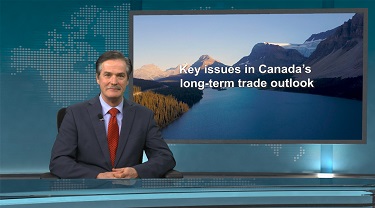
Key issues in Canada’s long-term trade outlook
Weekly Commentary March 05, 2020 There’s a lot of bad risk around; is there any “good” risk in our future?

Risky today, riskier tomorrow
Weekly Commentary February 27, 2020 Future risks are rising; is that bad news or good news?

Helping to make sense of uncertainty
Weekly Commentary February 13, 2020 Ups and downs throughout the world in 2019 has made for a choppy entry into 2020.

Canadian trade confidence continues to slide
Weekly Commentary February 04, 2020

China’s 2020 outlook
Weekly Commentary January 30, 2020 2020 is going to be a delicate year for China’s economy

Do weak demographics mean slower overall growth?
Weekly Commentary January 23, 2020 Are machines taking over?

Will 2020 bring an end to the policy pause?
Weekly Commentary January 09, 2020 Is trade policy mayhem here to stay?

Surprise of the decade
Weekly Commentary December 19, 2019 A decade is a long time; did this one have a pivotal eco-political moment?

Cold, cold Christmas for consumers?
Weekly Commentary December 12, 2019 Are consumers singing a dirge or a dance this holiday season?

Prices: Why so tame?
Weekly Commentary December 06, 2019 Prices may be tame - but will it last?

Navigating the oil market: Are G-suits still required?
Weekly Commentary November 28, 2019 Is the planet running out of crude oil? Not by any means.

EDC breaks down the Top 10 risks facing Canadian exporters
Weekly Commentary November 21, 2019 Export Development Canada is releasing its list of the Top 10 Global Risks facing Canada to help exporters prepare for an international environment fraught with uncertainty.

Exports grow as economy rebounds
Weekly Commentary November 14, 2019 Exporters hold on through 2020, but the best news may come later

Are the big trade spats one-sided?
Weekly Commentary November 07, 2019 If this goes wrong, there’s lots to lose all around

Slowdown: High-stakes game
Weekly Commentary October 31, 2019 The table stakes are high: recession or no recession

A Tale of Divergence
Weekly Commentary October 25, 2019 Rising uncertainty allows for the brave and informed to find opportunities.

Will robots rule the roost?
Weekly Commentary October 17, 2019 Robots don’t vote—but could they take over anyway?

Confidence checkup
Weekly Commentary October 03, 2019 With concern about slowing growth and political uncertainty, what are the gauges of confidence telling us?

Business economics: A renaissance?
Weekly Commentary September 26, 2019 Are business economists about to get a bit wealthier?

Is India at risk?
Weekly Commentary September 19, 2019 India has the capacity to right its recent wobbles.

Two-speed global economy
Weekly Commentary September 12, 2019 Will the slow gear stop the car in its tracks?

Uh-oh: Yield curve inversion!
Weekly Commentary September 05, 2019 Trade turmoil is spilling into financial markets, adding to current worries

Trade wars and the agriculture outlook
Weekly Commentary August 29, 2019 Is China's ban on U.S. agriculture exports a sign of more to come?

Today’s data agency: You!
Weekly Commentary August 22, 2019 You may not know it, but you are a data agency

Needed: Big breakthrough (or two!)
Weekly Commentary August 15, 2019 In today’s trade wars, are we in for boundless bouts of brinksmanship, or an abrupt breakthrough?

Uncertainty: At an all-time high?
Weekly Commentary August 08, 2019 Are we really more worried than ever about economic policy?

Debtrimental development?
Weekly Commentary July 26, 2019 Planet Earth’s love of debt is in full bloom. Should we worry?

The confidence paradox
Weekly Commentary July 18, 2019 Consumers are ignoring the summer Scrooge, but he’s giving businesses the blues.

Country risk: What’s on our radar?
Weekly Commentary July 11, 2019 Which markets are on our country risk radar as we head into the second half of 2019? Read on to find out more.

Interest rate reversal?
Weekly Commentary July 04, 2019 Flip-flops aren’t the favoured footwear of central bankers

What’s up with global shipping?
Weekly Commentary June 27, 2019 This leading indicator is bucking the current trend. What’s up?

As the world diversifies, will we?
Weekly Commentary June 20, 2019 Canada’s trade with the world ain’t the space it used to be. Can we adapt?

May the votes be with you
Weekly Commentary June 06, 2019 Maybe this will turn the Brexit tide, maybe not.

Chicago Bound!
Weekly Commentary May 30, 2019 To the Midwest, EDC says, “Mais oui!”

What’s logic got to do with it?
Weekly Commentary May 23, 2019 Is there method to the madness of today’s trade policy moves?

Who’s my neighbour?
Weekly Commentary May 16, 2019 Your new neighbours are increasingly defining the economic future. Get to know them!

U.S. Labour: return of the lost
Weekly Commentary May 09, 2019 The U.S. economy is experiencing a huge influx of disaffected workers

Go for the growth!
Weekly Commentary May 02, 2019 Catch-up economies are an increasingly important growth dynamo

Georgia On My Mind
Weekly Commentary April 25, 2019 Why is EDC opening up a representation in Atlanta? Good question.

All systems go?
Weekly Commentary April 18, 2019 Economy poised for liftoff, with a few bumps along the way

The Disease of dis-ease?
Weekly Commentary April 11, 2019 Today’s global risk environment is not going away anytime soon.

Canada’s ASEAN Opportunities
Weekly Commentary March 28, 2019 The growth record of ASEAN economies is reason enough to deepen ties.

Canada’s Asian Bonanza
Weekly Commentary March 21, 2019 One of our key impediments in Canada is that we seem to have a natural aversion to the risks, perceived or real, of dealing in Asian markets.

What’s the new model?
Weekly Commentary March 14, 2019 Is a new model of the economy in the works, and if so, what does it look like?

Will the U.S.-China trade tiff end well?
Weekly Commentary March 07, 2019 The stakes are high, elevating this to one of the top Canadian – and global – international trade concerns. No one knows this better than both the U.S. and China. So, will it end well?

Critical need for investment
Weekly Commentary February 28, 2019 What if our key growth issue isn’t demand, but capacity?

Charting the course through chaos
Weekly Commentary February 21, 2019 EDC reveals Top 10 Global Risks facing Canada’s exporters

The heart of the matter?
Weekly Commentary February 14, 2019 Is this key cause of US populism insurmountable?

Interest rates on hold
Weekly Commentary February 07, 2019 Are interest rate hikes too much for the economy to handle?

Mexico’s next move
Weekly Commentary January 31, 2019 Mexico’s future hangs in the balance

Canada’s growth zone
Weekly Commentary January 24, 2019 Canada’s economic traffic may be slowing…but there is a fast lane

And you thought 2018 was fun!
Weekly Commentary January 17, 2019 The world economy will have a number of hurdles to overcome in 2019

What happened in 2018 and what can we learn for 2019
Weekly Commentary January 10, 2019 Understand the past to navigate the future of country risk.

Surge in trade confidence short-lived
Weekly Commentary December 18, 2018 Canadian exporters confidence: from surge to dirge?

Surprise of the year: Stronger pact
Weekly Commentary December 13, 2018 Globalization is under attack…or is it?
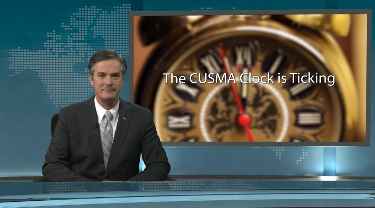
The CUSMA clock is ticking
Weekly Commentary December 06, 2018 CUSMA: Bumpy road to ratification?

The U.S. consumer boom
Weekly Commentary November 29, 2018 Another U.S. consumer bubble? Guess again.

China at the crossroads
Weekly Commentary November 22, 2018 With the challenges China faces, what’s the prognosis?
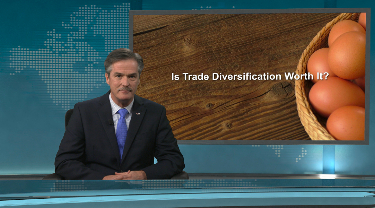
Is trade diversification worth it?
Weekly Commentary November 15, 2018 Is the US market really Canada’s only long-term trade bet?
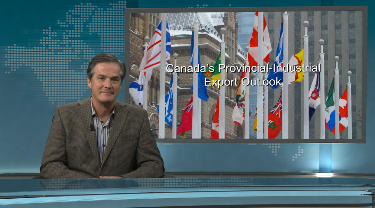
Canada’s provincial-industrial export outlook
Weekly Commentary November 08, 2018 Some surprising export stories at provincial and industrial levels

The Canada-Australia Connection
Weekly Commentary November 01, 2018 Oz: An Asian hot-spot for Canada?
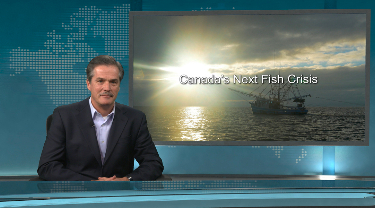
Canada’s next fish crisis
Weekly Commentary October 25, 2018 Can opportunity be a crisis for Canada’s fishing industry?

Managing the Mayhem
Weekly Commentary October 18, 2018 The outlook is bright, but big parts of the global economic puzzle need to come together.

Are global exports faltering?
Weekly Commentary October 11, 2018 Are trade fears crippling global export activity?
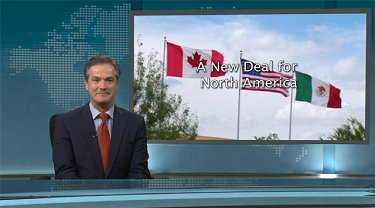
A New Deal for North America
Weekly Commentary October 04, 2018 With the new North American free trade deal, Canada has a green light for export growth.

Populism: On the way out?
Weekly Commentary September 27, 2018 Populism is challenging international trade axioms – but is it in decline?

Currencies tumble as markets reprice risk
Weekly Commentary September 20, 2018 How do we make sense of the current emerging market sell off? Read on to find out more…

Running Hot
Weekly Commentary September 13, 2018 Politics isn’t the only thing that’s hot south of the border
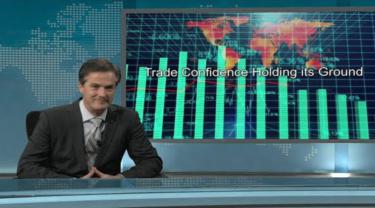
Trade confidence holding its ground
Weekly Commentary December 15, 2017 2017 has not been international trade’s best year. Oh, growth is having a good run alright; the problem is political. Just how is trade confidence doing?

Exposed!
Weekly Commentary November 16, 2017 NAFTA renegotiations has Canadians transfixed, as a majority of exports go to the US. What does this mean for Canada's provinces? How exposed are we?

Shifting stateside? Think about it…
Weekly Commentary July 27, 2017 Political rheotric and NAFTA re-negotiations have Canadian exporters worried about the U.S. These concerns are real, so it's important to do your homework.